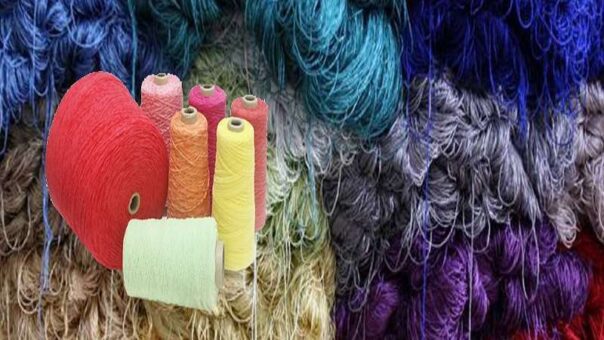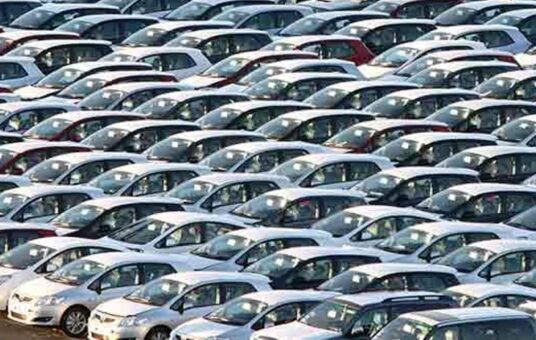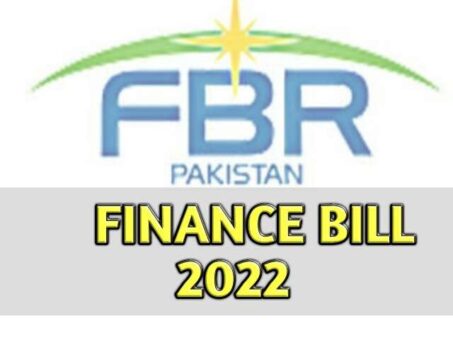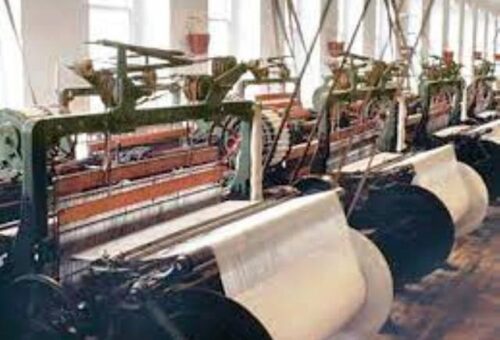The Auto Traders and Importers Association on Thursday reacted to the end of the 20% regulatory duty on used imported cars in Pakistan.
(more…)Tag: regulatory duty
-

Pakistan keeps 100 pc regulatory duty on car imports
ISLAMABAD: Pakistan has kept the 100 per cent regulatory duty on car imports till March 31, 2023.
(more…) -

FBR issues SRO to impose 5pc regulatory duty on yarn amid protest
ISLAMABAD: Federal Board of Revenue (FBR) has issued a SRO to impose regulatory duty at 5 per cent on import of polyester yarn despite protest by business community.
(more…) -

Merchants protest imposition of 5pc regulatory duty on polyester yarn
KARACHI: Yarn merchants have protested the levy of regulatory duty at 5 per cent on import of polyester filament yarn.
Economic Coordination Committee (ECC) of the cabinet this week approved the imposition of regulatory duty at five per cent on import of polyester filament yarn.
Pakistan Yarn Merchants Association (PYMA), while rejecting ECC decision to impose 5 per cent regulatory duty (RD) on polyester filament yarn, stated that it was primary raw material of textile industry. The association also termed that move as the cause of destruction of 800,000 power looms which were the lifeline of textile industry.
READ MORE: Pakistan slaps 5pc regulatory duty on yarn import
PYMA Senior Vice Chairman Sohail Nisar, Vice Chairman Javed Khanani, Former President FPCCI Nasir Hayat Magoon, Mohammad Usman, Saqib Goodluck, Khurshid Sheikh, Aslam Moten, Hanif Lakhany, Farhan Ashrafi, Danish Hanif, Saqib Naseem, Adnan Riaz, Khurram Bharara, Junaid Teli, Managing Committee and members strongly protested against ECC’s decision to impose RD on Yarn at Karachi Press Club, where they appealed to Prime Minister Shahbaz Sharif and Finance Minister Senator Ishaq Dar to suspend the ECC decision to save the SMEs sector of Pakistan from destruction.
“The government to issue directives not to impose RD on Yarn in the best economic interests of the country. Otherwise, SMEs will be shut down and millions of workers will be unemployed,” they requested.
READ MORE: PYMA urges government not to impose regulatory duty on yarn
PYMA leaders pointed out that there is already 11 per cent custom duty on polyester filament yarn, so with 5 per cent RD, the duty will be 16 per cent while fabric is also subject to 16 per cent duty. As a result of the imposition of RD, power looms will be locked and millions of workers will be unemployed while the 2 million households will be in poverty.
PYMA leaders questioned the government to benefit only two producers as to the wisdom of the decision to destroy Small & Medium Enterprises (SMEs), especially power looms which are associated with the textile industry. Although these two producers meet barely 25 per cent of the industry’s demand, they are not manufacturing other items.
Yarn merchants warned that they will continue their protest against the ECC’s imposition of 5 per cent RD on yarn until the decision is withdrawn. PYMA along with power looms owners of Karachi, Hyderabad, Tando Adam, Lahore, Multan, Faisalabad and Pakistan Art Silk Factories of Gujranwala were also protesting.
READ MORE: Industries threaten mass protest against gas supply shutdown
“National Tariff Commission (NTC), saying that the NTC sent its recommendations without any consultation with the stakeholders which was unfair. NTC must listen to us and any decision must be taken in consultation with stakeholders”, they criticized.
They mentioned to media persons that 11 per cent customs duty was imposed on the import of Polyester Filament Yarn, which will increase to 16 per cent after 5 per cent RD.
Yarn was subject to income tax, sales tax, additional sales tax and even anti-dumping. If all taxes were combined, 50 to 55 per cent taxes were paid on import stage of Yarn, yet the imported raw material was cheaper than both local two producers. From which the monopolies and extreme profiteering of the two producers can be estimated.
PYMA leaders pointed out, “Although local producers make only 25 per cent of the total demand of Polyester Filament Yarn, the textile industry has to depend on 75 per cent of imported Yarn. They further said that in the presence of ongoing inflation, high electricity and gas tariffs, labor issues, if more tax burden was imposed on industries, unemployment will increase and the government will have to pay many times more for 5 per cent RD.”
READ MORE: Pakistan organizes first international housing expo next month
PYMA leaders appealed to Prime Minister Shahbaz Sharif and Finance Minister Senator Ishaq Dar to maintain the current duty structure on Yarn and requested them to ask the ECC to avoid imposing regulatory duty on Yarn.
“Instead of measures to destroy economic activities, such policies should be formulated which will promote business and industrial activities and create ample employment opportunities.”
-

Pakistan raises Regulatory Duty to 100 % on motor vehicle import
Pakistan has increased the regulatory duty on imported motor vehicles from 90% to 100%. The decision, communicated through the issuance of SRO 1571(I)/2022 by the Federal Board of Revenue (FBR), comes as part of the government’s efforts to stabilize the balance of payments and manage the outflow of foreign exchange.
(more…) -

Pakistan decides 10% regulatory duty on petrol import
KARACHI: Pakistan has decided to impose regulatory duty at 10 per cent from July 01, 2022.
The country presented its federal budget 2022/2023 on June 10, 2022 and proposed increase on regulatory duty on various imported goods.
READ MORE: Penalty amount revised for late filing income tax returns
The Finance Bill, 2022 suggested levying 10 per cent regulatory duty on import of motor spirit as against existing rate of zero percent.
Experts at PwC A.F. Ferguson Chartered Accountants said that the notifications for amendments relating to regulatory duty and additional duty are yet to be issued. “The comments are based on ‘Salient Features’ issued with the finance bill,” they added.
READ MORE: Advance tax on immovable property purchase enhanced to 250% for non-filers
The government also proposed increase in regulatory duty from zero per cent to 10 per cent on other paper, paperboard, cellulose wadding and webs of cellulose fibers.
Furthermore, the government planned to increase regulatory duty from 10 per cent to 20 per cent on optic fiber cables.
The Finance Bill also proposed amendments in reduction of regulatory duties, which included:
Regulatory duty has been proposed to be reduced as follows:
Case hardening steel from 30 per cent to 20 per cent
Chrome yellow from 15 per cent to 0 per cent
The Finance Bill proposed reduction / concessions in customs duty:
Customs Duty (CD) leviable on the import of following categories of items / sectors is proposed to be exempted for incentivizing the respective sectors:
READ MORE: Pakistan massively increases taxation on motor vehicles
– Machinery and capital goods for mechanization of farming including machinery pertaining to irrigation, drainage, harvesting, plant protection etc.
– Specified raw materials used for manufacturing of LED lights, LED bulbs (including parts thereof) and brush ware.
– 26 Active Pharmaceutical Ingredients for incentivizing Pharmaceutical manufacturers.
– Raw materials for manufacture of first aid bandages.
– Membranes for filtering / purifying water.
– The drug ‘Grafalon’ and gadget ‘Irisvision’.
– Raw materials of Ivy leaves extract powders.
– Motor spirit.
In addition to CD, Additional Customs Duty (ACD) is also proposed to be exempted on import of the following goods:
– Raw materials imported by paper sizing industry and chlorinated paraffin wax industry and manufacturers of aluminum conductor composite cores.
– Stamping foils for manufacturing of optic fiber cables.
– Aluminum paste and powder imported by the Coating industry.
– Guts, bladders and stomachs of animals.
READ MORE: New rates of capital gain tax on disposal of securities
Reduction in Customs Duty and Additional Customs Duty
CD leviable on import of following goods is proposed to be reduced:
– Specified categories of other woven fabrics and artificial flowers / foliage of other materials imported by manufacturers of footwear.
– High-density fiber (HDF) boards of wood or other ligneous materials
– Specified fibers of polypropylene.
In addition to CD, ACD, leviable on import of following goods is also proposed to be reduced:
– Direct and reactive dyes.
– Glycerol crude and Glycerol for the coating industry.
– Goods pertaining to Aluminum, polymers of ethylene, Biaxially Oriented Polypropylene (BOPP) used by the packing industry.
– Adhesive, Epoxide resins, Filter media/ paper, Non-woven fabric media and Steel plates / sheets of prime quality imported by manufacturers of filters, other than automotive.
READ MORE: Pakistan slaps 45% corporate tax on banks
– Organic composite solvents and thinners imported by manufacturers of Dibutyl Orthophthalates.
– Plywood, veneered panels & similar laminated wood, poly (methyl methacrylate) and cyanoacrylate.
– Flavoring powders for food preparation for snacks manufacturers.
-

FBR exempts regulatory duty on Afghan pine nuts
ISLAMABAD: The Federal Board of Revenue (FBR) has exempted regulatory duty at the rate of 45 per cent on import of pine nuts (chilgoza) from Afghanistan.
The FBR issued SRO 181(I)/2022 dated February 22, 2022 to allow the exemption.
Through the latest SRO, the FBR amended the SRO 840(1)/2021 dated June 30, 2021.
The FBR through the latest SRO noted: “[pine nuts (chilgoza) imported from Afghanistan are exempted from regulatory duty at the rate of 45 per cent.”
Prior to this the Pakistan government expanded the list of goods for export to Afghanistan and through Afghanistan to Central Asian Republics without requirement of E-form and against Pakistan Rupee (PKR).
In this regard the ministry of commerce issued SRO176(I)/2022 dated February 04, 2022 to amend Export Policy Order 2020.
READ MORE: List of goods export to Afghanistan in PKR, no E-form
As per the export policy order, export goods to Afghanistan and through Afghanistan to Central Asian Republics are allowed against Pakistan currency on filing of regular shipping bills without the requirement of E-form.
Prior to the amendment, the allowed goods are included: fruits; vegetables; dairy products; and meat. However, after the amendment more number of goods have been added to the list, which included: rice; fish and fish products; poultry, meat and products; sugar confectionary and bakery products; fruits, nuts and other edible parts of plants; oilcake and other solid residues; vegetable materials and vegetable waste; salt; cement; pharmaceuticals; matches; textile and textile articles; building stone; and surgical instruments.
As per the Export Policy Order, 2021, the goods are not entitled to: zero rating of sales tax on taxable goods; rebate of central excise duty; and payment of drawback of customs duty.
-

Regulatory duty on motor vehicles increased to 50%
In a bid to curb the escalating import bill and foreign exchange outflow, the Federal Board of Revenue (FBR) unveiled a significant surge in regulatory duty on the import of new motor vehicles.
(more…) -

Yarn merchants appeal for not imposing regulatory duty
KARACHI: Pakistan Yarn Merchants Association (PYMA) has expressed serious concerns over reports suggesting imposition of regulatory duty on polyester yarns.
Saqib Naseem, PYMA Central Chairman in a statement on Wednesday expressed deep concern over rumors circulating about lobbying for imposition of regulatory duty on imported polyester yarns by local manufacturers of polyester filament yarns.
READ MORE: FPCCI urges measures to overcome gas crisis
He urged Adviser to Prime Minister on Finance, Shaukat Tarin not to succumb to the pressure of local manufacturers, and to reject any proposal for imposition of regulatory duty on imports of polyester filament yarns, especially HS Code 5402.3300 and HS Code 5402.4700.
Appealing in a letter to Finance Advisor Shaukat Tarin, Chairman PYMA said that the local manufacturers of polyester filament yarns were lobbying the concerned agencies, especially the Ministry of Commerce, to impose regulatory duty on imported polyester yarns.
This would be extremely detrimental to the local consumers of polyester filament yarn, and would be against the government’s policy of ensuring the availability of raw materials to the industry and consumers at competitive prices.
READ MORE: Yarn merchants demand cut in interest rate
Saqib Naseem said “In the letter that despite the fact that local manufacturers of polyester filament yarns are already enjoying discounted tariffs, efforts to implement regulatory duties will significantly increase the production cost of local industries”, fearing that therefore, no such proposal should be considered which is detrimental to the domestic industries.
PYMA chairman was of the opinion the current custom duty of 11% is rather excessive. For your information the custom duty on polyester staple fiber is 7% and the local manufacturers of PSF seem to be doing with this level of protection. There is no significant production cost difference between polyester staple fiber and polyester filament yarn.
READ MORE: PYMA demands cotton import through land routes
He added that the weaving and knitting industry (user industry) is already facing a very challenging situation due to very high cotton and polyester yarn prices, and imposition of regulatory duty would be extremely counterproductive especially when the local user industry has to import 65 per cent of its requirements of polyester filament yarn from foreign suppliers.
Saqib Naseem urged the government not to listen to the unjust pressure of local manufacturers of polyester filament yarns to impose regulatory duties, and only take measures to reduce the cost of production of domestic industries and stabilize the economy.
-

Restrictions to up motor vehicle cost, reduce demand
KARACHI: The planned restrictions on automotive industry likely to increase the cost of motor vehicles and simultaneously to reduce the demand.
According to analysts of Topline Securities on Auto Sector, the government is planning to introduce measures to control rising import bill of the country by imposition of increased duties on luxury items including cars. The proposals according to news reports include increase in duties on import of Completely Built Unit (CBUs) and higher Federal Excise Duty (FED) on locally manufactured vehicles.
READ MORE: Pakistan’s car sales declines by 6% in October
The proposed measures under consideration include: 1) increase in regulatory duty (RD) on electric vehicles with 50 KWH battery pack from 10 per cent to 50 per cent, 2) increase in custom duty to 50 per cent from 15 per cent on Hybrid Vehicles on 1501-1800cc cars, 3) increase in FED from 5 per cent to 10 per cent on locally manufactured cars with engine capacity of 1500cc+.
The government has shelved the plan to impose ban on import of CBU and is likely to increase duties and taxes only to curtail rising import bill.
To recall, Pakistan total imports surged by 65 per cent to $25bn in first four months of fiscal year 2021-2022, which led to a current account deficit of $5.1 billion versus surplus of $1.3 billion in same period of the last fiscal year.
READ MORE: Ghandhara Nissan to launch Chery vehicles current fiscal
Pakistan total transport group imports surged by 140 per cent to $1.5bn in first four months of the current fiscal year exerting pressure on total import bill of the country.
It is pertinent to note that as per the Auto Policy of 2016-21, auto manufacturers were allowed to import 100 units of CBU for test marketing before they can start production of cars locally.
This led to sharp rise in CBU imports and there are news reports of potential misuse of the policy as few new entrants have imported more than 100 units.
READ MORE: Tax rates on motor vehicles during tax year 2022
As per said news reports, around 7000 units MG HS by MG Motors have been delivered to the buyers since November 2020 till date whereas it local production of cars just started recently in May 2021.
Similarly, import of other CBUs which includes Toyota Cross, Land Cruiser, Honda Accord etc have also led to higher import bill.
It will be interesting to see how the concerned authorities address the issue as the old auto policy expired in June 2021 and we still await for the new policy.
During the last fiscal year, used CBU imports clocked in at 21,247units whereas new CBU imports touched 6,394 units. The combined (old + new CBUs) contributed around 11 per cent of Pakistan car sales in the last fiscal year.
READ MORE: Indus Motors posts 195% growth in net profit to Rs5.42bn
The analysts said that latest numbers for the same are not available but looking at increased interest of new cars specially in the SUV segment we expect this number to be much higher in FY22.
They believe the decision to increase regulatory duty on CBUs will result in high car prices and may result in reduced demand for imported CBUs by new entrants. It may also force the new entrants to start manufacturing vehicles locally.
However, since the proposal to ban import completely is highly unlikely, the above stated measures are not likely be materially positive for local listed assemblers.
Additionally, expected increase in Federal Excise Duty (FED) to 10 per cent from 5 per cent on 1500+cc locally assembled cars and rising KIBOR (Karachi Interbank Foreign Exchange Rate) is likely to impact car demand going ahead.
READ MORE: SBP issues KIBOR rates on December 08, 2021
Stringent regulatory measures by SBP on auto financing and rising KIBOR is likely to impact car sales going ahead. It is important to note that, auto-financing on average contribute around 30-40 per cent of the total car sales of the industry. In November 2021, Pakistan car sales are anticipated to drop by 10 per cent MoM owing to the above stated measures.
The analysts expect Pakistan car sales to grow by 10 per cent in the ongoing fiscal year after a strong sales recovery in last fiscal year.
They have an ‘underweight’ stance on Pakistan Auto Sector based on the premise of 1) rising kibor, 2) stringent auto-financing policies, 3) increasing cost pressures, 4) likely increase in FED, and 5) expected macroeconomic slowdown.
